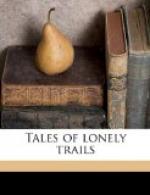Take the Brazilian hunter of the jungle. He is solitary. He is sufficient to himself. He is a survival of the fittest. The number of his tribe are few. Nature sees to that. But he must eat, and therefore he hunts. He spears fish and he kills birds and beasts with a blow-gun. He hunts to live. But the manner of his action, though more skilful, is the same as any hunter’s. Likewise his sensations, perhaps more vivid because hunting for him is a matter of life or death. Take the Gaucho of Patagonia—the silent lonely Indian hunter of the Pampas. He hunts with a bola, a thin thong or string at each end of which is a heavy leather-covered ball of stone or iron. This the Gaucho hurls through the air at the neck or legs of his quarry. The balls fly round—the thong binds tight—it is a deadly weapon. The user of it rides and stalks and sees and throws and feels the same as any other hunter. Time and place, weapon and game have little to do with any differences in hunters.
Up to this 1919 hunting trip in the wilds I had always marveled at the fact that naturalists and biologists hate sportsmen. Not hunters like the Yellow Knife Indians, or the snake-eating Bushmen of Australia, or the Terra-del-Fuegians, or even the native country rabbit-hunters—but the so-called sportsmen. Naturalists and biologists have simply learned the truth why men hunt, and that when it is done in the name of sport, or for sensation, it is a degenerate business. Stevenson wrote beautiful words about “the hunter home from the hill,” but so far as I can find out he never killed anything himself. He was concerned with the romance of the thought, with alliteration, and the singular charm of the truth—sunset and the end of the day, the hunter’s plod down the hill to the cottage, to the home where wife and children awaited him. Indeed it is a beautiful truth, and not altogether in the past, for there are still farmers and pioneers.
Hunting is a savage primordial instinct inherited from our ancestors. It goes back through all the ages of man, and farther still—to the age when man was not man, but hairy ape, or some other beast from which we are descended. To kill is in the very marrow of our bones. If man after he developed into human state had taken to vegetable diet—which he never did take—he yet would have inherited the flesh-eating instincts of his animal forebears. And no instinct is ever wholly eradicated. But man was a meat eater. By brute strength, by sagacity, by endurance he killed in order to get the means of subsistence. If he did not kill he starved. And it is a matter of record, even down to modern times, that man has existed by cannibalism.




